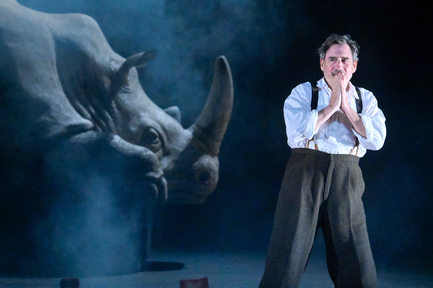On rhinocerization – Manea in an interview by Carla Baricz published in LA Review of Books in 2014.
You say in your essay, “The Incompatibilities” that Sebastian’s Journal is an account of the “rhinocerization” of certain Romanian intellectuals, whom Sebastian counted among his friends. You discuss Mircea Eliade, E. M. Cioran and Constantin Noica. Can you elaborate on the term “rhinocerization?”
The word comes from one of Eugene Ionesco’s plays, and Ionesco is an interesting case. He was not very political. In fact, he was one of the very few intellectuals in this group who did not condone this sort of right-wing nationalism. He said somewhere that when he left Romania, around 1939, and reached the Hungarian border, he felt that he was finally saved. At the end of the war, in ’44, he wrote in his diary that he would never shake hands with Eliade, Ionescu, Cioran any of those people. Of course, later they became friends. That’s exile. In exile, they suddenly felt like Romanians in Paris. And they were reconciled, and they started talking again. But as I said before, Ionesco felt differently during and right after the war. He says in his diary that “I could have become anything — I could have become a legionary, I could have become a dog, I could have become a base beast in that atmosphere.” And then he wrote this play, Rhinoceros, which discusses the slow transformation of human beings into rhinoceros, meaning beasts. The only person who remains human is the guy who is not virtuous, who is a drunk, who is lazy, who doesn’t work. All these other guys who display great principles, moral principles, become rhinoceros. But this man, who is human in his defects, remains human. This is the metaphor of the play.
The play was presented in the late ’60s or early ’70s in Romania, in a wonderful production with [Radu] Beligan in the leading role. For us, of course, it was anti-totalitarian and anti-communist, but it applies to all totalitarian systems. It’s about the slow degradation and loss of real humanness. Up to the very end, the rhinoceros maintain that they are the very best, that they are patriots. It should be said that, in Romania, the right-wing movement that gained support in the ’30s was very different from Nazism and fascism. Nazism and Fascism were atheistic movements, movements against the church. The Legionary movement was religious — Christian Orthodox. It was a different thought process: “The Jews have to be eliminated because we have to have this pure life, the life God wants us to lead, or Jesus, or whatever.” In that way, it was similar to what the communist movement advocated. The communist utopian ideology was based on the idea of “the new man.” This was a very dangerous idea, because real life is imperfect, we are imperfect, and when you ask us to be perfect, well, that’s the first step towards terror and tyranny.
Read the interview here.
‘Rhinoceros’ is a very important play for me, I read it for the first time when I was 14, it was part of my high school education.
Perhaps the metaphor of ‘Rhinoceros’ works too well, is too obvious, because the play is hardly performed anymore.
And the process of rhinocerization is still taking place everywhere.
Being virtuous is no guarantee that you won’t dehumanize other people, quite the opposite. That’s a message that was and still is not very popular.
